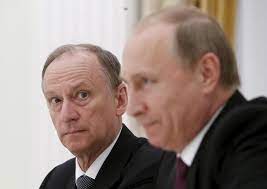Russia's Spookification And North Koreanization PT 1

This post is about Russian politics and ties together my thoughts over the past day, which I have already tweeted about. I am going to tie them together here in a more coherent way.
Back in 2016, when Russiagate was rearing its head and before it was made into an almost religious movement that obscured very real misdeeds and disturbing trends, my friend Alex Hazanov and I wrote something for the Washington Post. Back then, I was a very cloistered grad student and didn't write much outside of classes and papers; when I did, it was about Russia. I think this was my first or second piece of public-facing writing. In it, Alex – who did significant work on the internal culture of the KGB – and I argued that the election hack, whatever its American meaning, showed that something had changed in Russian politics. Previously, such blatant interference in American domestic politics would have been unthinkable. Late-Soviet and post-Soviet Russian diplomacy was conservative and professional. It was well understood that American domestic politics was off-limits, and stability was the overarching goal.
We argued that something had changed. The previous old guard of Russian foreign policy in the Ministry of Foreign Affairs and, to some extent, the SVR – Russia's external intelligence service – was no longer in control. It was the spooks who were now in charge. Alex and I probably should have clarified what we meant here. The specific ex-KGB siloviks running Russian policy were not the refined, worldly aristocracy of the "first directorate" which spied on the West and later turned into the SVR. They were domestic counterintelligence people and agents who worked in the Eastern Bloc, like Putin himself.
These people have a particular culture wrapped in insane conspiracy theories. For example, it is a matter of almost religious belief that a decades-long multinational conspiracy destroyed the USSR to morally corrupt Russians authored by a cabal of Jewish bankers and Allen Dulles. Suppose this isn't weird enough for you. In that case, many, including Putin's de facto national security advisor and uber-reactionary hawk, Nikolai Patrushev, believe that the US has plans to break up Russia based on an ex-KGB psychics' alleged reading of Madaline Albright's mind. The general contours of this story are that Americans believe that Russians are not responsible enough to manage their vast natural resources, so they must be made slaves. As far as anyone can tell, this is the origin of this narrative, and it has become so ubiquitous in Russian propaganda that it has become part of common sense in Russia. I'm not making this shit up...
There is a corollary to this. These same lunatics believe that Russia is in an eternal war. If this war is fought in terms of economic and technological progress, Russia is always the weaker party for some strange cultural and social reason. Russia's strength is its traditional culture and its people's willingness to fight and die. Thus, in a Cold War, Russia will lose. So, in turn, Russia must aggressively use its opponent's moments of weakness to improve its geopolitical position and then hunker down for a difficult assault from the more advanced "commercial (often implied to be Jewish)" West. Thus, Russian policy would become ever more erratic and weird, with people of this background having more influence. The DNC hacks were the cherry on top of a political culture that no longer looked like what the old guard of US-Russia relations was used to.
We got quite a bit of pushback from the larger community of Russianists for this article (much of it private, so I won't be linking it). First, there was the common defensive backlash about writing anything related to Russia-gate. I'm not going to address that because this wasn't about Russia gate – it was about Russia. Second, there was a valid complaint about how we discussed the KGB. For example, we juxtaposed Primakov positively with Putin as a real conservative and realist. Primakov was a KGB man through and through despite his academic cover. Indeed, he wound up leading the SVR. We should have made clear this is a very different tribe than the people we are talking about.
However, I think this criticism also showed an assumption made by many of these critics – that ultimately, US-Russian relations could be built based on realism and spheres of influence. That is fine and dandy if you are dealing with other realists. And, most Russianists, even in security-adjacent fields, deal with reasonable realists like the aforementioned Primakov or, say Dmitri Trenin. The issue is that this isn't who is driving the bus. Such ideas about co-existence and the Russian threat being overblown did not reckon with the rise of what Mark Galleoti so eloquently calls the adhocracy. I prefer to call it the deinstitutionalization of the Russian state. This means that the people you think are in charge of things like foreign policy aren't. The guy that ran the Russian railroads might have had more influence due to his closeness with Putin.
In this environment, finding a common language, let alone the rules of conduct that the realists would like us to develop, is almost impossible. But that is an incredibly difficult pill to swallow for people who, like me, are either Russian by origin or like being in Russia sometimes. It also has terrifying implications that we are living through now. There is a small silver lining here. The system these people built and their batshit beliefs are so institutionally weak and divorced from reality that they, rather than the professional soldiers, drew up insane and unrealistic invasion plans for Ukraine. The Russian Army has not recovered since.
Part 2 of this, which I'll write at some point over the break, will temper this glimmer of hope. Because the political economy that these people want to create in Russia is a full-scale war economy, and I fear that Putin, after resisting this, is going to give in because he has no other choice.
